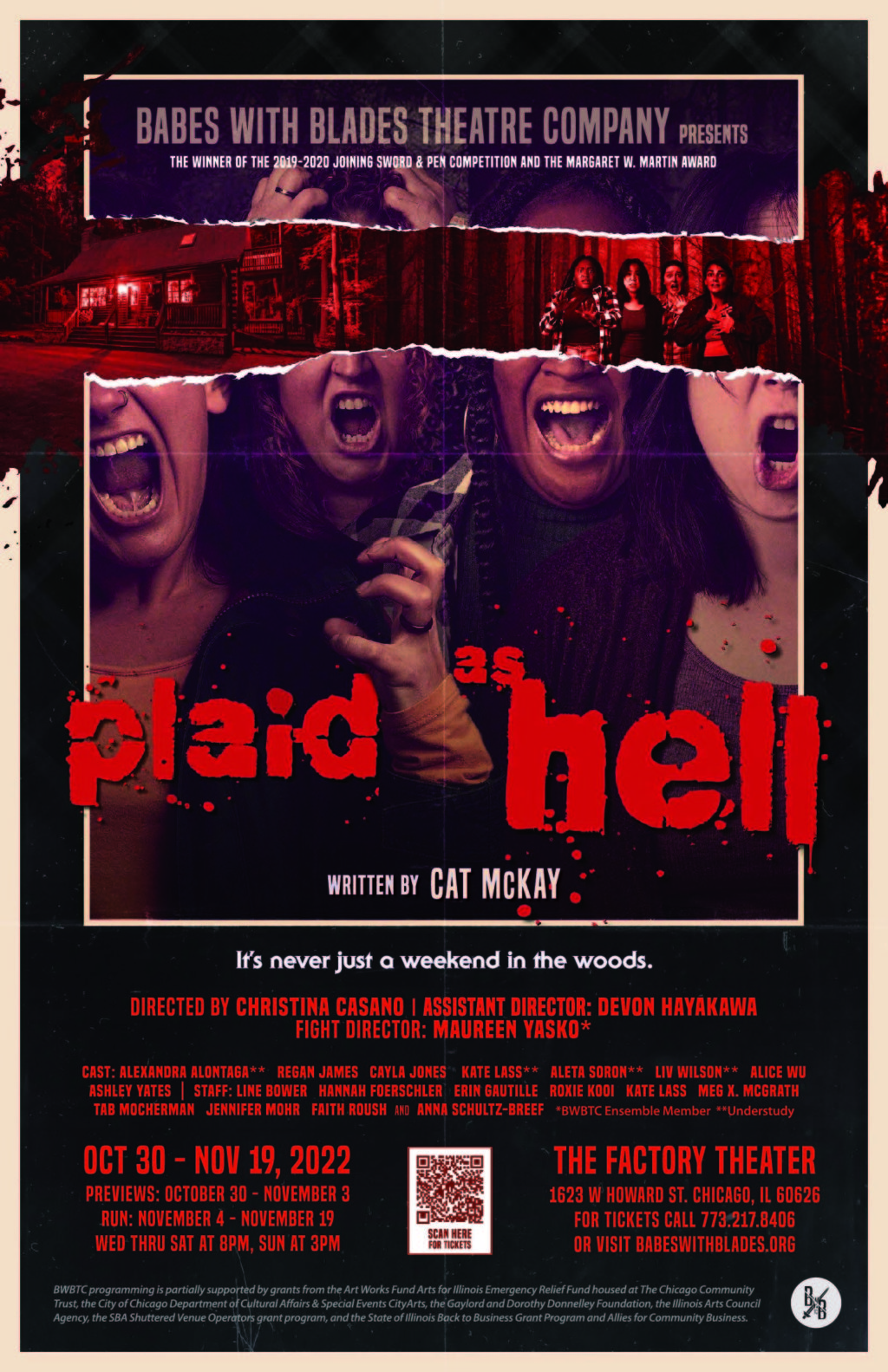
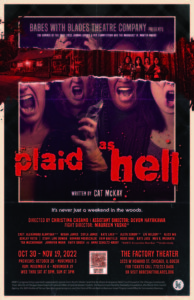 [rating=2]“Plaid as Hell” by Cat McKay is a rather plebeian dramady that runs hot and cold. While the audience seems to respond well to its sexually tinged humor, it is much too uneven of a story. Although one of its (presumed) purposes is to extol the physicality of women and their ability to fend for themselves, this thread could have been handled better, with a sense of greater purpose and resolve.
[rating=2]“Plaid as Hell” by Cat McKay is a rather plebeian dramady that runs hot and cold. While the audience seems to respond well to its sexually tinged humor, it is much too uneven of a story. Although one of its (presumed) purposes is to extol the physicality of women and their ability to fend for themselves, this thread could have been handled better, with a sense of greater purpose and resolve.
This is a story about four lesbian women: Jess (Ashley Yates), Cass (Reagan James), Emilie (Cayla Jones), and Kelly (Alice Wu) who rent an Airbnb cabin near Devil’s Lake, Wisconsin, for a weekend getaway. This is planned as a retreat in the woods far away from civilization. The intrigue begins when we learn that this is a relatively new relationship for Jess and Cass and that they are madly in love with each other. Cass’s former lover was Emilie, and the two went back to Girl Scouts at the age of 11. Kelly, who is a friend of Cass’s, is doing Cass a big favor: to smooth out any likely friction between Cass’s old flame Emilie and her new relationship Jess. Although Kelly is also a lesbian, she is not a romantic partner to any of the others, and it’s possible that she may be bisexual. Jess is in residency at the University of Chicago as a medical doctor and is new to the group. One can sense her discomfort around Emilie and Kelly, and it becomes clear that Jess approaches life very differently from the two.
The play starts out as a comedy, where we see bonds form among the four women characters. The show is especially charming when Emilie and Cass dance and are involved in physical interaction. The grimy references to sex are often amusing; plus, the romantic scenes between Cass and Jess are heartfelt. The various missteps between the characters makes the show funny as well. When the four of them decide to play a made-up game using a pizza box, the audience is drawn in, and we almost feel as if we are playing the game with them.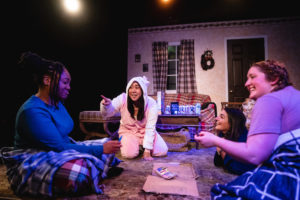
Earlier in the show, a character receives an alert on her cell phone, where reference is made to a spree killer who is out on the loose. That mention obviously foreshadows the mystery of what is to come—and what might have happened to Cass when she suddenly goes missing. Was she another victim of this killer, or did some other unforeseen event occur? From a comedy about romantic tension, the focus shifts to solving the matter of Cass’s disappearance. Initially, this part is very good, because life is often like that: Everything seems to be going okay until one moment when it’s not. And in this case, a seemingly innocent event takes turn for worse. The stage is somewhat dimmed right at the moment when the angst is greatest. And the night I saw the show, that was when someone in the audience popped a beer. That sound got just as many laughs as the previous comedy before it.
But it was right after this moment when the clever, fun, and poignant parts of the show become eclipsed by the illogic of much of the remaining story. Allow me to break this down. First, there are a few too many lines where the four women busily lecture each other about what to do next. Next, when they think they might have captured the “bad guy”, it was just too weird how two of the characters would have any sympathy for him. Even if he has not done anything untoward to Cass, he most certainly has just beaten up and brutalized each of them. Although the attacker may or may not have known anything about Cass’s whereabouts, what is so wrong for the other three women to have tied him up in the bedroom so he cannot move? Why is there so much discussion about the possibility that he might escape from the cabin or that they might consider letting him go—possibly to reoffend again?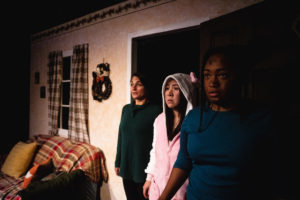
But the most illogical part of the story has to do with the time period of the setting. According to the playbill, the story takes place in the year 2017, and we watch the characters on their cell phones throughout. Via cell phone alerts, we learn not only about a likely murderer but also about oncoming bad weather: a super storm that finally arrives. So here’s the rub: The moment that Cass disappears, why doesn’t someone call the police to report a missing person? Why jeopardize their own lives to go outside in the heavy rain to look for her, knowing that there is a mass killer lurking in the woods, especially if they think he might have possibly killed or injured Cass? Finally, after they encountered this masked man who attacked them brutally, someone should have called the police right then and there, so that the police could conceivably arrest him? Then too, maybe the police are needed to dispatch an ambulance to attend to the women’s wounds. If there is any thought that the women might have been the aggressors (and that the attacker has been tied up needlessly-LOL!), all of the details could easily be sorted out at a later time.
Maureen Yasko’s realistically staged violence and intimacy design is always on the mark: interesting and entertaining, inevitable and enviable. It is as if the script has been intentionally written to serve as backdrop for the close contact regarding the lesbian theme as much as it is for a demonstration of violence against the intruder. Costuming is interesting. Kelly is set apart from the others as she wears Hello Kitty pajamas and carries a suitcase in the Hello Kitty design. In contrast, the three other women always wear some form of plaid clothing or they separately wrap themselves up in plaid blankets. This distinguishes the three who are a part of the love interest, while Kelly is along for the ride. While each embraces a different variety of plaid, the patterns and colors differ from the plaid draperies and plaid room decorations that make up the interior of the cabin, the province of set designer Erin Gautille and props designer Meg X. McGrath.
The dynamics of the foursome are cleverly drawn, and this helps to flesh out the women’s widely varying approaches regarding how to handle Cass’s disappearance. One of the best parts of the show is a later conversation between Emilie and Jess about what Cass means to both of them as both a friend and a lover. I also liked the part where Jess says that as a doctor that she knows how to kill someone—even though earlier in the show, she claims that she doesn’t. This shows a true depth of character, which comes out when placed in a tough situation. Although there is just enough in the story to advance some of the threads set forth in the beginning, a lot of it is superfluous and often quite crude. The worst part is when none of the women try to summon help on their phones when Cass suddenly vanishes. What might have worked in this show was if someone were to try to phone the police and cannot get a signal, because the weather is so bad outdoors and a cell tower is down. But nobody even tries to call. Instead, when we listen to the issues that the women raise about what to do with their imprisoned attacker, the story falls flat on its face. I felt bad that the underlying script wasn’t any better.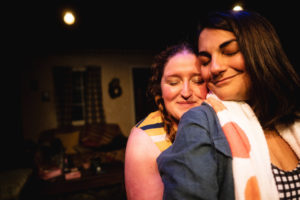
“Plaid as Hell”, directed by Christina Casano and produced by Babes with Blades, is running through November 18, 2022, at The Factory Theater, 1623 W. Howard Street, in Chicago.
Tickets are $20-$35.
Performance schedule:
 Wednesdays, Thursdays, Fridays, and Saturdays – 8:00 p.m.
Wednesdays, Thursdays, Fridays, and Saturdays – 8:00 p.m.
Sundays – 3:00 p.m.
Live streamed performances on Wednesday, November 16 through Friday, November 18.
To purchase tickets and for more information, go to: https://babeswithblades.org/fall-2022-plaid-as-hell/.
Because of the show’s themes, audience members must be 18 or over.
COVID requirements are still in effect. You must wear a mask covering your nose and mouth in the building and throughout the entire performance.
To see what others are saying, visit www.theatreinchicago.com, go to Review Round-Up and click at “Plaid as Hell”.





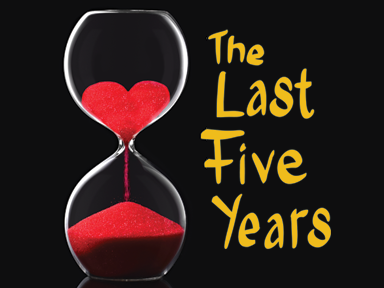
More Stories
“The Firebugs” reviewed by Julia W. Rath
“The Book of Grace” Al Bresloff with another from Paul LIsnek
“The Last Five Years” MILWAUKEE